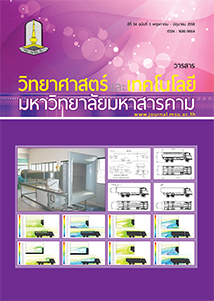Community-Based Health Education Intervention to Control Glycemia Risk Factors in Type 2 Diabetic Patients in Rural Districts of the Northeast Region
Main Article Content
บทคัดย่อ
The purpose of this study was to evaluate the effects of a diabetes self-management program on knowledge of diabetes and glycemic control among patients with diabetes mellitus. The sample included 147 adults 35 years old and older with type 2 diabetes. The samples came for a follow up visit at the diabetic clinic from a community hospital and primary health care setting, in Ban Fang and Namkieng Hospital. Participants were randomly assigned to experimental and compared groups. The experimental group received the diabetes self-management program that consisted of diabetes education, self-efficacy promotion, and self-management skills training, whereas the compared group received usual care. Data were collected using the Knowledge of Diabetes Scale from patients that had been tested for their psychometric properties, measurment of serum fasting plasma glucose, hemoglobin A1c, and lipid profiles. Data were analyzed using descriptive, paired t-test. Results showed that at twenty four weeks after enrollment, the experimental group demonstrated a significant difference in knowledge of diabetes, decreased fasting plasma glucose, and hemoglobin A1c. However, the findings from a focus group showed that a small group required diabetes education (about nutrition) Further, discussion for diabetes self-management should be conducted by nurses with those who have poor diabetic control. Volunteers may assist nurses with basic care such as serving healthy food, transporting patients, making plans for workouts and running errands. Volunteers must attend a Nursing Training Session before volunteering in a hospital unit. Results from this study suggest that the diabetes self-management program is effective in diabetes control and can be used in people with uncontrolled diabetes.
Article Details
บท
บทความวิจัย

